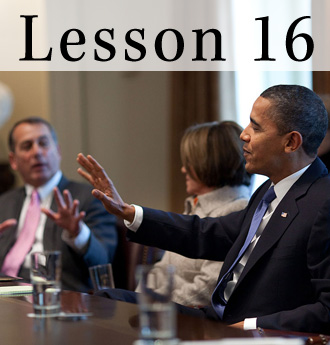The Resource Center » Level 3 » Unit 3 »
Lesson 16: What Is the Role of Political Parties in the Constitutional System?

Lesson Purpose
Lesson Objectives
- explain why the Framers opposed the idea of political parties,
- describe the other ideas that helped political parties to gain acceptance,
- explain the conflicting points of view that led to the development of parties and the roles that political parties have played in the American constitutional system, and
- evaluate, take, and defend positions on the importance of political parties today.
Lesson Terms
Lesson Biographies
Lesson Court Cases
Case Summary
In the wake of the Watergate affair, Congress attempted to ferret out corruption in political campaigns by restricting financial contributions to candidates. Among other things, the law set limits on the amount of money an individual could contribute to a single campaign and it required reporting of contributions above a certain threshold amount. The Federal Election Commission was created to enforce the statute.
Question(s)
Did the limits placed on electoral expenditures by the Federal Election Campaign Act of 1971, and related provisions of the Internal Revenue Code of 1954, violate the First Amendment's freedom of speech and association clauses?
Answer(s)
In this complicated case, the Court arrived at two important conclusions. First, it held that restrictions on individual contributions to political campaigns and candidates did not violate the First Amendment since the limitations of the FECA enhance the "integrity of our system of representative democracy" by guarding against unscrupulous practices. Second, the Court found that governmental restriction of independent expenditures in campaigns, the limitation on expenditures by candidates from their own personal or family resources, and the limitation on total campaign expenditures did violate the First Amendment. Since these practices do not necessarily enhance the potential for corruption that individual contributions to candidates do, the Court found that restricting them did not serve a government interest great enough to warrant a curtailment on free speech and association.
Lesson Primary Sources
Federalist No. 70 was written by Alexander Hamilton and examines the question of a plural executive, arguing that having multiple presidents introduces conflict and difference of opinion. It is the fourth of a series of eleven essays on the executive.






